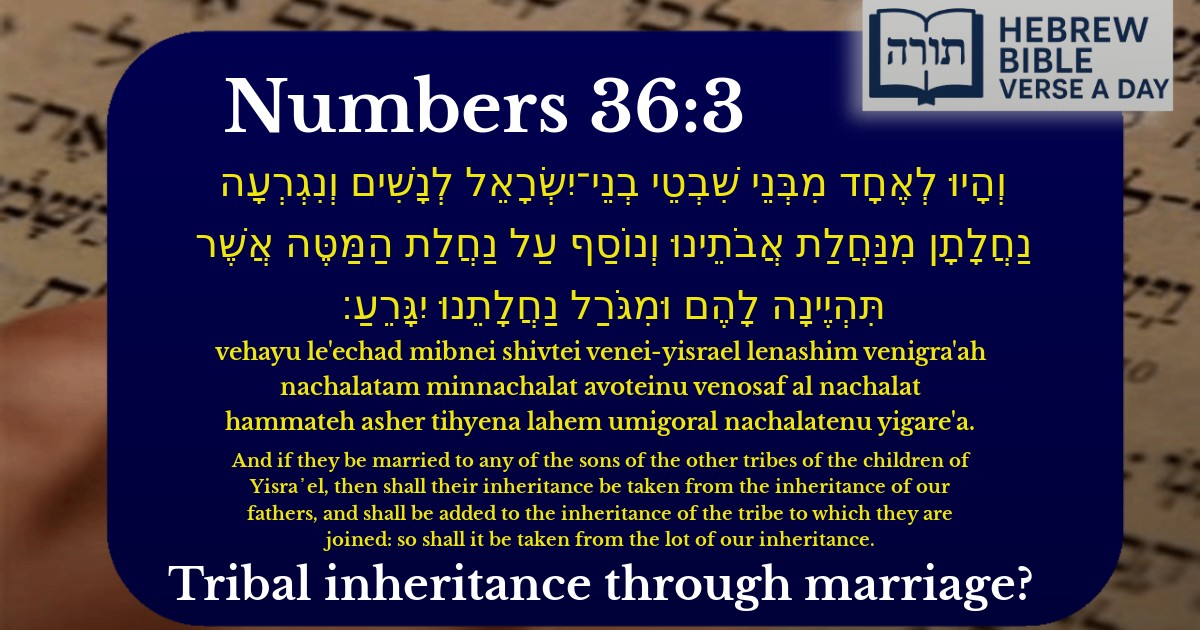Join Our Newsletter To Be Informed When New Videos Are Posted
Join the thousands of fellow Studends who rely on our videos to learn how to read the bible in Hebrew for free!
Hebrew Text
וְהָיוּ לְאֶחָד מִבְּנֵי שִׁבְטֵי בְנֵי־יִשְׂרָאֵל לְנָשִׁים וְנִגְרְעָה נַחֲלָתָן מִנַּחֲלַת אֲבֹתֵינוּ וְנוֹסַף עַל נַחֲלַת הַמַּטֶּה אֲשֶׁר תִּהְיֶינָה לָהֶם וּמִגֹּרַל נַחֲלָתֵנוּ יִגָּרֵעַ׃
English Translation
And if they be married to any of the sons of the other tribes of the children of Yisra᾽el, then shall their inheritance be taken from the inheritance of our fathers, and shall be added to the inheritance of the tribe to which they are joined: so shall it be taken from the lot of our inheritance.
Transliteration
Vehayu le'echad mibnei shivtei venei-yisrael lenashim venigra'ah nachalatam minnachalat avoteinu venosaf al nachalat hammateh asher tihyena lahem umigoral nachalatenu yigare'a.
Hebrew Leining Text
וְ֠הָי֠וּ לְאֶחָ֞ד מִבְּנֵ֨י שִׁבְטֵ֥י בְנֵֽי־יִשְׂרָאֵל֮ לְנָשִׁים֒ וְנִגְרְעָ֤ה נַחֲלָתָן֙ מִנַּחֲלַ֣ת אֲבֹתֵ֔ינוּ וְנוֹסַ֕ף עַ֚ל נַחֲלַ֣ת הַמַּטֶּ֔ה אֲשֶׁ֥ר תִּהְיֶ֖ינָה לָהֶ֑ם וּמִגֹּרַ֥ל נַחֲלָתֵ֖נוּ יִגָּרֵֽעַ׃
וְ֠הָי֠וּ לְאֶחָ֞ד מִבְּנֵ֨י שִׁבְטֵ֥י בְנֵֽי־יִשְׂרָאֵל֮ לְנָשִׁים֒ וְנִגְרְעָ֤ה נַחֲלָתָן֙ מִנַּחֲלַ֣ת אֲבֹתֵ֔ינוּ וְנוֹסַ֕ף עַ֚ל נַחֲלַ֣ת הַמַּטֶּ֔ה אֲשֶׁ֥ר תִּהְיֶ֖ינָה לָהֶ֑ם וּמִגֹּרַ֥ל נַחֲלָתֵ֖נוּ יִגָּרֵֽעַ׃
🎵 Listen to leining
Parasha Commentary
📚 Talmud Citations
This verse is not quoted in the Talmud.


Context in Sefer Bamidbar
This verse (Bamidbar 36:3) appears in the context of the daughters of Tzelofchad, who had previously been granted the right to inherit their father's portion in Eretz Yisrael. The leaders of the tribe of Menashe raise a concern that if these women marry men from other tribes, their inherited land would transfer to their husbands' tribes during the Yovel (Jubilee) year, thereby diminishing Menashe's tribal portion.
Rashi's Explanation
Rashi explains that the tribal leaders were concerned about two potential scenarios:
Rashi notes that their concern was motivated by a love for the Land, not by personal interest (Bamidbar 36:3).
Halachic Implications
The Rambam (Hilchot Nachalot 1:7-8) derives from this passage several important inheritance laws:
Midrashic Insights
The Midrash Tanchuma (Pinchas 9) praises the daughters of Tzelofchad for their wisdom in presenting their case properly before Moshe. It contrasts their proper approach with the tribal leaders' initial hesitation to speak directly about the inheritance issue.
Concept of Tribal Unity
The Kli Yakar emphasizes that this passage teaches the importance of maintaining tribal distinctions in Eretz Yisrael. Each tribe had its unique spiritual role and geographic portion that contributed to the nation's completeness. The concern about inheritance was not merely about land ownership but about preserving the divinely ordained tribal structure.